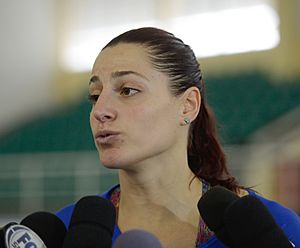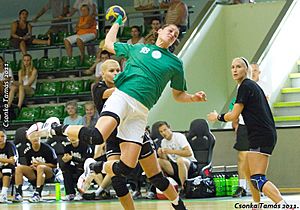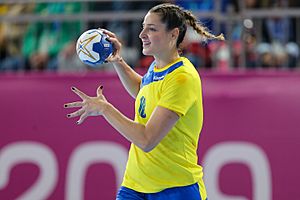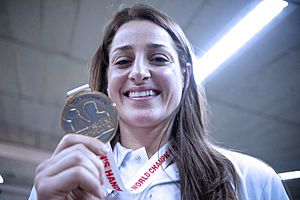Eduarda Amorim facts for kids
Quick facts for kids Eduarda Amorim |
|||||||||||||||||||||||||||||||||||||||||||
|---|---|---|---|---|---|---|---|---|---|---|---|---|---|---|---|---|---|---|---|---|---|---|---|---|---|---|---|---|---|---|---|---|---|---|---|---|---|---|---|---|---|---|---|
 |
|||||||||||||||||||||||||||||||||||||||||||
| Personal information | |||||||||||||||||||||||||||||||||||||||||||
| Full name | Eduarda Idalina Amorim Taleska | ||||||||||||||||||||||||||||||||||||||||||
| Born | 23 September 1986 Blumenau, Brazil |
||||||||||||||||||||||||||||||||||||||||||
| Nationality | Brazilian Hungarian |
||||||||||||||||||||||||||||||||||||||||||
| Height | 1.86 m (6 ft 1 in) | ||||||||||||||||||||||||||||||||||||||||||
| Playing position | Left back | ||||||||||||||||||||||||||||||||||||||||||
| Number | 18 | ||||||||||||||||||||||||||||||||||||||||||
| Youth career | |||||||||||||||||||||||||||||||||||||||||||
| Years | Team | ||||||||||||||||||||||||||||||||||||||||||
|
–2002
|
Colégio Barão do Rio Branco | ||||||||||||||||||||||||||||||||||||||||||
| Senior clubs | |||||||||||||||||||||||||||||||||||||||||||
| Years | Team | ||||||||||||||||||||||||||||||||||||||||||
|
2002–2004
|
Metodista/São Bernardo | ||||||||||||||||||||||||||||||||||||||||||
|
2004–2006
|
USCS/São Caetano | ||||||||||||||||||||||||||||||||||||||||||
|
2006–2009
|
Kometal Gjorče Petrov Skopje | ||||||||||||||||||||||||||||||||||||||||||
|
2009–2021
|
Győri ETO KC | ||||||||||||||||||||||||||||||||||||||||||
|
2021–2022
|
Rostov-Don | ||||||||||||||||||||||||||||||||||||||||||
|
2022
|
CSM București | ||||||||||||||||||||||||||||||||||||||||||
| National team | |||||||||||||||||||||||||||||||||||||||||||
| Years | Team | Apps | (Gls) | ||||||||||||||||||||||||||||||||||||||||
|
2006–2021
|
Brazil | 204 | (677) | ||||||||||||||||||||||||||||||||||||||||
| Teams managed | |||||||||||||||||||||||||||||||||||||||||||
|
2023–
|
North Macedonia (assistant) | ||||||||||||||||||||||||||||||||||||||||||
|
Medal record
|
|||||||||||||||||||||||||||||||||||||||||||
Eduarda "Duda" Amorim Taleska, born on September 23, 1986, is a famous former handball player from Brazil and Hungary. She spent most of her career playing for Győri ETO KC in Hungary. With this team, she won the EHF Women's Champions League, a top European club competition, five times.
Duda also played for the Brazil women's national handball team for 15 years. She helped Brazil win the 2013 World Women's Handball Championship. This was a historic win, as it was the first time Brazil or any South American country won this title.
In 2014, the International Handball Federation named her the IHF World Player of the Year. A website called Handball Planet also voted her the best player of the 2010s. Many people consider her one of the greatest handball players ever. In 2023, she was honored by being included in the European Handball Federation Hall of Fame.
Contents
Duda Amorim's Handball Journey
Starting Young
Duda Amorim first started as a rhythmic gymnastics athlete. Her older sister, Ana Amorim, was already a handball player for Brazil. Ana encouraged Duda to try handball. Duda began playing at age 11 at Colégio Barão do Rio Branco.
In 2002, Duda joined Metodista/São Bernardo after being invited by Silvio Rodriguez. She finished second with her new team that season. Two years later, playing for USCS/São Caetano, Duda won a state junior championship. She played many games, often for youth, junior, and adult teams all at once!
Playing in Europe
In February 2006, Duda moved to Europe. She joined her sister at Kometal Skopje in Macedonia. Duda played for Kometal for three and a half seasons. The club then faced money problems and had to let some players go.
Duda found a new team in Hungary, signing with Győri ETO KC in February 2009. This became her main club for many years.
Success with Győr
Duda Amorim became a huge star with Győri ETO KC. She won the EHF Women's Champions League five times: in 2013, 2014, 2017, 2018, and 2019. This is a very important club competition in Europe. In 2014, fans voted her the best left back in the competition.
Duda played her last professional season with Rostov-Don in Russia. She left the team in March 2022 because Russian teams were not allowed to play in the Champions League. She then joined CSM București in Romania. After the season ended in May 2022, Duda announced she was retiring from playing handball.
Playing for Brazil
Duda Amorim won gold medals in three Pan American Games with the Brazilian national team. These wins were in Rio in 2007, Guadalajara in 2011, and Lima in 2019. She also played in four Olympic handball tournaments. Her team reached the quarterfinals in London 2012 and Rio 2016. In 2013, she won the 2013 World Women's Handball Championship and was named the Most Valuable Player (MVP) of the tournament.
Major Achievements
- World Championship:
- Winner: 2013
- EHF Champions League:
- Winner: 2013, 2014, 2017, 2018, 2019
- Hungarian League:
- Winner (10 times): 2009, 2010, 2011, 2012, 2013, 2014, 2016, 2017, 2018, 2019
- Hungarian Cup:
- Winner (11 times): 2009, 2010, 2011, 2012, 2013, 2014, 2015, 2016, 2018, 2019, 2021
- Pan American Championship:
- Winner: 2007, 2011, 2017
- Pan American Games:
- Winner: 2007, 2011, 2019
Awards and Honors
- IHF World Player of the Year: 2014
- EHF Player of the Year: 2019
- MVP of the World Championship: 2013
- Best Defender of the EHF Champions League: 2016, 2017, 2019, 2020, 2021
- EHF Hall of Fame: 2023
Personal Life
Duda Amorim married Dean Taleski from Macedonia in 2013. Their daughter, Idalina, was born in May 2023. Duda also earned a master's degree in sports management.
See also
 In Spanish: Eduarda Amorim para niños
In Spanish: Eduarda Amorim para niños
 | Georgia Louise Harris Brown |
 | Julian Abele |
 | Norma Merrick Sklarek |
 | William Sidney Pittman |




